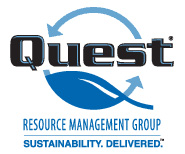How the industry can navigate this year’s challenges with operationally and economically efficient solutions.
By Ray Hatch – President & CEO of Quest Resource Management Group
Making predictions about global supply chain sustainability trends is challenging with the fluctuations the industry has experienced in recent years. Nevertheless, 2023 was a prime example of how the supply chain can sustainably adapt under vulnerable conditions.
In previous years, manufacturers, distribution centers, and other workers within the supply chain navigated disruptions such as ongoing labor shortages, escalating inflation, and new compliance codes. These challenges have evolved the industry, and 2024 will be no different. In this increasingly dynamic environment, companies should prepare for the new year’s obstacles and seize the narrative with these possible solutions while keeping sustainability top of mind.

Challenge: Companies industry-wide are accelerating their pursuit of environmental, social, and governance (ESG) initiatives, from reducing carbon emissions to reusing/recycling materials and utilizing data for ESG reporting. According to a 2023 Forbes report, 82% of businesses increased their investments in data modernization, up from 41% in 2022.
Not only are customers demanding improved sustainability efforts from brands but there’s also a growing requirement to collect and share data. For example, the U.S. government has agreed to spend $369 billion on sustainability efforts, including climate resilience, electric vehicle infrastructure, and tax breaks for low-carbon energy. However, the complexity of the requirements makes accurate data collection and reporting necessary.
Solution: As supply chains strive to mitigate the risk and impact of disruptive events, making data collection the industry norm can lead to actionable insights that improve ESG outcomes, help an enterprise achieve its business goals, and create more (profitable) opportunities. A data strategy can help organizations map objectives and priorities.
Structured, ready-to-use sustainability data and its disclosure can also help:
Dedicating time and resources to collect, analyze, and visualize data is essential. However, taking the next step of turning that information into action insights is key. Unfortunately, many fail to get to that level, leaving valuable insights at the table.

Challenge: Artificial intelligence is on the rise and impacting all industries. A 2023 study showed that 35% of companies are using AI-powered tools, while 42% are exploring it for implementation in the future. We should expect those numbers to climb this year as more companies embrace supply chain tech to digitize the process and help alleviate pain points.
Solution: Rather than being behind the curve and playing catch up later, supply chains can utilize AI to process massive amounts of data and obtain valuable information to improve the system. Users can pick out patterns and trends to establish future predictions with a high degree of accuracy.
In the case of waste and recycling, AI can sort recyclables without running into as many risks. With growing fears of fluctuating ESG scores, AI is a useful tool to capture the data you need to be more sustainable and correctly sort materials. These accuracies and improvements help eliminate repetitive tasks and unnecessary travel to concentrate on more complex problems that require human interactions.

Challenge: Data collecting/reporting and technology will continue to play critical roles in helping companies adapt quickly to the business landscape. However, they also increase complexity and the need for more integration between different systems, both internally and across the business ecosystem.
Solution: Companies need to identify a continuity plan for integration. A managed service provider can offer the range of skills required on an on-demand basis to maintain continuity, availability, and optimal utilization of resources. Establishing a network of advocates – or having access to expertise from across the nation/globe – is vital to drive sustainability initiatives, meet enterprise goals, and remain compliant.
As new changes emerge in 2024, these steps toward a more sustainable and efficient operation can equip businesses with risk awareness and contingency plans to improve their chances of success in the ever-changing supply chain landscape.

About Quest Resource Management Group
Quest is a national provider of waste and recycling services that enable larger businesses to excel in achieving their environmental and sustainability goals and responsibilities. Quest’s blog and thought leadership

About Ray Hatch, CEO + President
Ray Hatch has served as President and Chief Executive Officer of Quest Resource Management Group (NASDAQ: QRHC) since February 2016. A senior executive with in-depth experience building profitable businesses and orchestrating transformational growth, Ray brings over 25 years of experience in both the waste management and food services industries. He has managed businesses and/or business units with as many as 600+ employees and more than one billion dollars in revenue.
Scott Ellyson, CEO of East West Manufacturing, brings decades of global manufacturing and supply chain leadership to the conversation. In this episode, he shares practical insights on scaling operations, navigating complexity, and building resilient manufacturing networks in an increasingly connected world.